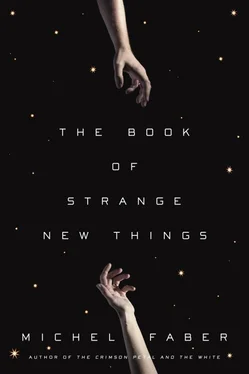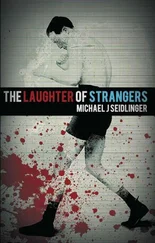‘Sure. It’s not much different than living in the Arctic Circle, I guess. You adjust your sleep pattern so that you’re awake when everybody else is.’
‘What about those guys in the mess hall right now?’
She shrugged. ‘Stanko’s scheduled to be there because he’s on night duty. The other guys… well, people get insomnia sometimes. Or they get all slept out.’
‘What about the people of Oasis — the… uh… natives? Are they asleep right now? I mean, should we wait until the sun comes up?’
She faced him with an unblinking, defensive stare. ‘I have no idea when they sleep. Or even if they sleep. To be straight with you, I know almost nothing about them, even though I probably know more than anyone here. They’re… kind of hard to get to know. I’m not sure they want to be known.’
He grinned. ‘Nevertheless… I’m here to know them.’
‘OK,’ she sighed. ‘It’s your call. But you look tired. Are you sure you’ve had enough rest?’
‘I’m fine. What about you?’
‘Fine also. Like I said, give me an hour. If, in that time, you change your mind and want to sleep some more, let me know.’
‘How would I do that?’
‘The Shoot. There’s a scroll-down menu behind the USIC icon. I’m on it.’
‘Glad to hear there’s one menu that’s got something on it.’ He meant it as a rueful comment on the mess hall, but as soon as the words left his mouth, he worried she might take them the wrong way.
She opened her door, he did the same on his side, and they stepped out into the moist swirling dark.
‘Any other advice?’ he called over the top of the vehicle.
‘Yes,’ she shot back. ‘Forget the denim jacket.’
The power of suggestion? She’d told him he looked tired and he hadn’t felt tired when she said it, but he felt tired now. Befuddled, too. As though the excessive humidity had seeped into his brain and fogged his thoughts. He hoped Grainger would escort him all the way back to his quarters, but she didn’t. She led him into the building through a different door from the one he’d used as an exit, and, within half a minute, was bidding him au revoir at a T-junction in the corridors.
He walked off in the opposite direction from her, as she clearly expected him to, but he had no clear idea where he was going. The passage was empty and silent and he couldn’t recall having seen it before. The walls were painted a cheerful blue (turned somewhat darker by the subdued lighting) but were otherwise nondescript, with no signs or pointers. Not that there was any reason to expect a sign pointing to his quarters. USIC had made it clear, during one of the interviews, that he would not ‘in any way, shape or form’ be the official pastor of the base and shouldn’t be surprised if there wasn’t much call for his services. His true responsibility was to the indigenous inhabitants. Indeed, that was his job description in the contract: Minister (Christian) to Indigenous Population .
‘But you do have a minister for the USIC personnel’s needs, surely?’ he’d asked.
‘Actually, at the moment, no,’ the interviewer had replied.
‘Does that mean the colony is officially atheist?’ Bea had asked.
‘It’s not a colony,’ another of the USIC interviewers said, with an edge to her voice. ‘It’s a community. We do not use the word colony. And we do not promote any faith or lack of faith. We’re looking for the best people, that’s all.’
‘A pastor specifically for the USIC staff is a fine idea, in principle,’ the first interviewer reassured them. ‘Especially if he — or she — had other useful skills. We’ve included such individuals in the team at various times in the past. Right now, it’s not a priority.’
‘But my mission is a priority?’ Peter had said, still scarcely able to believe it.
‘We would classify it “urgent”,’ the interviewer said. ‘So urgent, in fact, that I must ask you… ’ He leaned forward, looked straight into Peter’s eyes. ‘How soon can you leave?’
Now there was a light glowing around the next bend in the corridor, and a faint harmonious noise which he identified, after a moment, as piped music. He had walked too far, failed to spot his own room, and ended up back at the mess hall.
When he re-entered, he found that there had been a few changes. The ghostly croon of Patsy Cline had vanished from the airwaves, replaced by cocktail jazz so bland that it barely existed. The two black guys had left. The Chinese guy had woken up and was leafing through a magazine. A petite middle-aged woman, maybe Korean or Vietnamese, with a dyed streak of orange through her black hair, was staring meditatively at a cup in her lap. The Slavic-looking guy behind the counter was still on duty. He appeared not to notice Peter walking in, mesmerised as he was by a game he was playing with two squeezable plastic bottles — ketchup and mustard. He was trying to balance them against each other, tipped at an angle so that only their nozzles touched. His long fingers hovered above the fragile arrangement, ready to enfold the bottles when they fell.
Peter paused in the doorway, suddenly cold in his sweat-soaked denims and bedraggled hair. How ridiculous he must look! For just a few seconds, the sheer alienness of these people, and his irrelevance to them, threatened to flood his spirit with fear, the paralysis of shyness, the terror that a child feels when faced with a new school filled with strangers. But then God calmed him with an infusion of courage and he stepped forward.
‘Hello everybody,’ he said.
5. Just as he recognised them for what they were
In the eyes of God, all men and women are naked. Clothes are nothing more than a fig leaf. And the bodies beneath are just another layer of clothing, an outfit of flesh with an impractically thin leather exterior, in various shades of pink, yellow and brown. The souls alone are real. Seen in this way, there can never be any such thing as social unease or shyness or embarrassment. All you need do is greet your fellow soul.
At Peter’s greeting, Stanko set the bottles to rights, looked up and grinned. The Chinese guy gave a thumbs-up salute. And the woman, who’d been dozing with her eyes open, unfortunately got a fright and jerked her legs, spilling coffee into her lap.
‘Oh my…!’ cried Peter, and rushed over to her. ‘I’m so sorry!’
She was wide awake now. She had on a loose smock and pants, much like Grainger’s but beige. The spilled liquid added a large brown blotch.
‘It’s OK, it’s OK,’ she said. ‘It wasn’t that hot.’
An object flew past Peter’s face, landing on the woman’s knee. It was a tea towel, tossed by Stanko. Calmly she began to swab and dab. She lifted the hem of her dress, revealing two damp patches on her gauzy cotton slacks.
‘Can I help?’ said Peter.
She laughed. ‘I don’t think so.’
‘My wife uses vinegar on coffee stains,’ he said, keeping his eyes on her face so that she wouldn’t think he was ogling her thighs.
‘This isn’t real coffee,’ the woman said. ‘Don’t worry about it.’ She balled up the tea towel and placed it on the table, in an unhurried, methodical motion. Then she settled back into her chair, apparently in no rush to change. The jazz muzak lapsed into silence for a moment, then the cymbals and snare drum were tickled by a pair of brushes, the saxophone exhaled, and the noodling began once more. Stanko busied himself with something tactfully noisy, and the Chinese guy studied his magazine. Bless them, they were trying to give him space.
‘Have I blown my chance to introduce myself?’ he said. ‘I’m Peter.’
‘Moro. Pleased to meet you.’ The woman extended her right hand. He hesitated before shaking it, having noticed that one of her fingers ended at a knuckle stub and her pinky was missing altogether. He took hold and she squeezed, confidently.
Читать дальше












